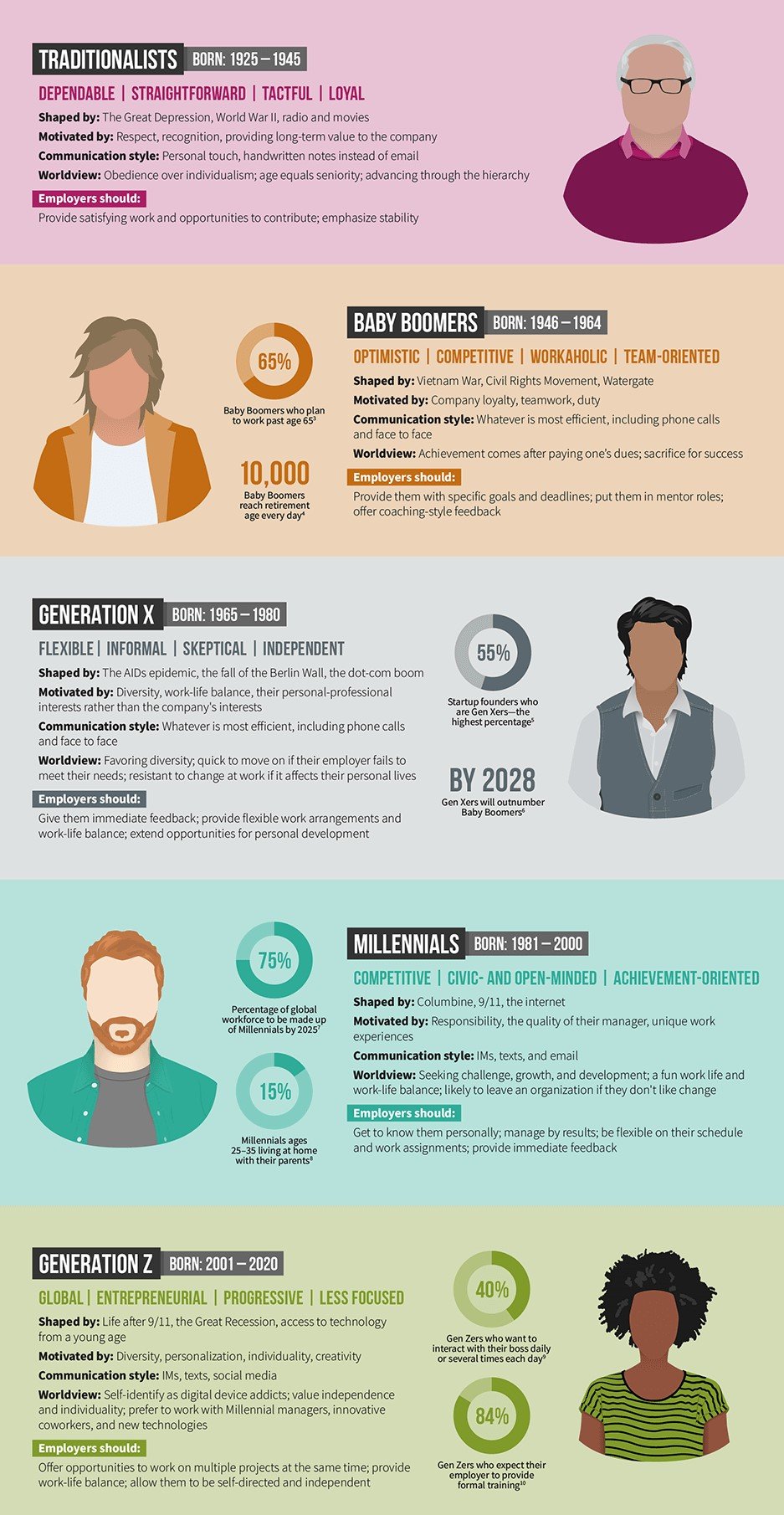I don’t know about you, but I’m tired of all this talk of generational differences.
For the last 20 years or more we’ve decided that segmenting the working population by age makes sense. Put simply it allows us to generalize about ‘Baby Boomers’ and how they are so much different from Gen X and any of the other alphabet based generations.
Before proceeding, here’s a quick recap on the broad generations; the years they are born between (which are still being debated); some high-level characteristics of each generation; critical events that shaped them; and how employers “should” manage those in that generation:

I find it interesting that providing flexibility and W/L balance seem to be common managerial approaches over the last 50 – 60 years, which begs the question – are different approaches to managing generational differences really required?
While I’ll acknowledge there are differences in terms of the life shaping events that each ‘generation’ experienced when growing up, gross generalisations of differences are just that – gross generalisations.
Let’s choose a high profile example we can all relate to.
Elon Musk was born in 1971 – and therefore is by definition a Gen Xer. While he meets many of the Gen X characteristics outlined above, I’m pretty sure that he would also be characterised as competitive, a workaholic, entrepreneurial and someone who has a global (if not universal) perspective.
A couple of the specific issues I have with using generational differences to simplify employee management are:
1. The differences within a generation (intra-generational differences) are as significant as the difference between generations
For example someone born in 1982, who would have relied on the local library, and as a teen the CD-ROM version of the encyclopedia (remember those?) as their source of truth, is going to have a vastly different view of the world to someone born in 1998 for whom access to the internet and the unlimited information this brought provided them as they grew up. Yet they are both ‘millenials’.
2. Generational Differences exclude the impact of stage of life.
Think back on how you behaved at different stages of your life and what was important to you.
At the severe risk of being guilty of gross generalization myself (and using a nuclear family as a basis for the argument), regardless of generation, young people entering the workforce are likely to be more competitive than older employees. They want to get ahead in their career and as such will be more comfortable challenging conventions and taking risks. As they settle into their chosen profession and grow older, they are likely to want increased security and stability – as mortgage repayments and the costs of raising a family start to kick in. As their kids become more independent and ultimately leave home they will start thinking more about retirement, their investments, and the rising cost of living. They may want more flexibility in their job to enable them to pursue personal interests, or seek to re-skill for a job they always wanted to do, or decide to start a second family or …. any range of things.
So where does all this leave people managers?
It’s actually quite simple.
Rather than be driven by perceived differences between workers based on their age (and the underlying generalisations of generational differences discussed) seek instead to understand each individual, what’s driving them and what’s important to them. Before commenting that sounds like too much work, the average span of managerial control is 1 manager to 5-8 staff, so talking with your staff and understanding what motivates and drives them is doable – and should be a core part of a manager’s role.
Don’t use broad brush strokes to decide how to deal with people. To make life simple, think about people as “Generation Me”. Treat each person as a distinct and unique individual – after all that’s what they are!
AT THE END OF THE DAY, “GENERATION ME” ISN’T GOING TO EVER DISAPPEAR OR BE REPLACED BY A LETTER!



